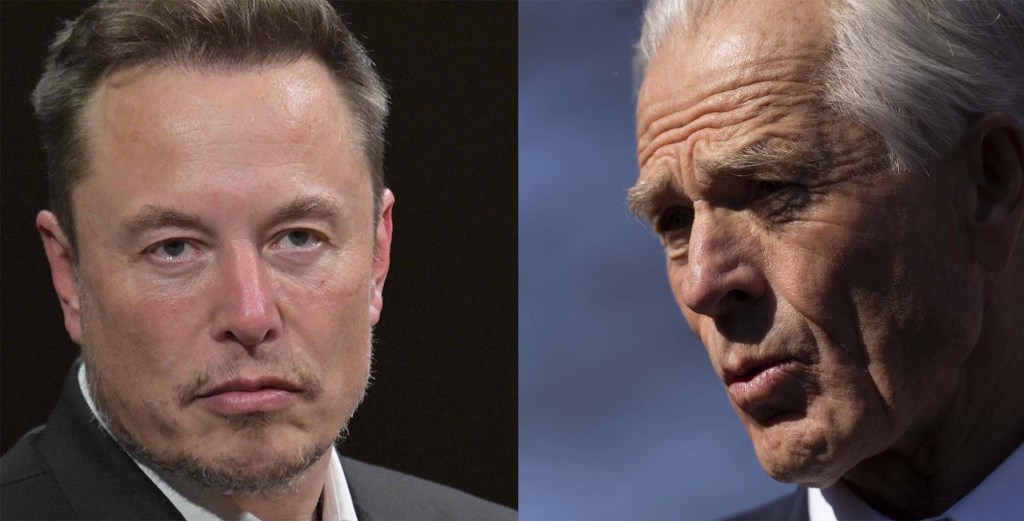
The very public – and often sophomoric– fights emerging within President Trump’s inner circle have exposed the many different factions desperately competing for Trump’s ear.
The two spats – one between Elon Musk and trade advisor Peter Navarro and the other between Treasury Secretary Scott Bessent and Commerce Secretary Howard Lutnick – burst into the public’s view this week as chaos over Trump’s trade policy unnerved markets and business leaders.
Ultimately, these fights have immense consequences for the future of Trump’s term.
Given Trump’s nature, whichever side can rack up more “wins” will largely shape Trump’s domestic, economic, and foreign policy.
To that end, White House Press Secretary Karoline Leavitt attempted to brush the issue aside, saying, “boys will be boys,” but the emerging fissures go deeper than mere disagreements over tariff policies.
They are symbolic of a proxy war between the longtime MAGA loyalists and the more recent, often more practical – or less extreme – supporters.
The former are represented by committed ideologues like Navarro, Lutnick and Steve Bannon, who have long pushed Trump to adopt more hardline policies.
At the same time, the latter, represented by Musk and other tech and finance titans like Bill Ackman are less idealistic, having backed Trump hoping he would usher in economic prosperity and take a more centrist, common-sense approach to social and cultural issues.
Of the two conflicts, the one between Musk and Navarro has been the most public, largely taking place on Musk’s X platform.
After Musk took to X to push back against heavy-handed tariffs, Navarro went on CNBC and derided Musk’s Tesla as a simple “car assembler” rather than an actual “car manufacturer.”
Navarro then insinuated that Tesla’s manufacturing process undermines Trump’s preference for American-made cars, clearly striking a nerve with the world’s richest man and most visible Trump supporter.
Musk responded by saying Navarro is “truly a moron,” accused him of spreading false information, referred to Navarro as “dumber than a sack of bricks.”
Plainly, opinions of Musk aside, his position on trade and tariffs is the correct one.
Where he believes in truly free trade and understands the benefits of increased global trade, Navarro has been the administration’s loudest champion of protectionist tariffs that would strangle American businesses, bring global trade to a halt, and likely cause a recession.
Put another way, Trump would be wise to pay greater attention to the segment of Trump’s coalition that Musk represents – practical, libertarian, and committed to American dominance of the future industries that will shape the global economy – than the more extreme, isolationist wing led by Navarro.
The other fight within the administration, between Bessent and Lutnick, has not been nearly as public, but it may be even more important for the American economy.
Indeed, Bessent has reportedly been advising Trump that tariffs must be a negotiating tactic, rather than a permanent policy, including flying to Florida to push the president to soften his tone.
According to Politico, Bessent “told Trump that markets would remain in peril unless he started putting more emphasis” on the endgame of tariffs – new trade deals – and stopped talk of the “pain” Americans would have to endure in a protracted trade war.
Bessent’s approach is in direct conflict with Lutnick, who has made regular media appearances stressing that high tariffs are permanent, including telling CNN, Trump is “not going to back off on tariffs.”
Lutnick’s tenure has been marked by these sorts of gaffes.
During a CNBC interview on Wednesday, he credited Trump’s policies for the historic surge in the stock market, seemingly oblivious that it was entirely due to Trump doing the very thing Lutnick pledged he wouldn’t do – backing off on tariffs.
On the trade issue, it appears that the Bessent-Musk wing won out, for now at least.
The 90-day pause Trump announced on Wednesday may not be a guarantee of no future trade war, but it does give time to negotiate the kind of deals Bessent has advocated for, while suspending the suffocating tariffs pushed by Navarro.
Undoubtedly, that policy is the correct one. Had the initial tariffs remained in force for months, the U.S. almost inevitably would have entered a recession.
To be sure, these divisions are not new. They have been simmering since even before the inauguration.
Last December, the cracks in Trump’s coalition first emerged over the issue of H-1B visas for highly skilled immigrants. Musk was again leading one side, arguing that these workers allowed American tech companies to maintain their global advantage.
The other side, led by Bannon and Laura Loomer, fiercely pushed back, claiming that these migrants – mostly from India – were taking jobs away from Americans.
Trump eventually came down on Musk’s side, ending that fight, but not the overarching issue of courting a coalition with wildly different – and often contradictory – views.
For example, Loomer is now apparently back in Trump’s good graces, reportedly being behind the firing of multiple national security officials for supposed “disloyalty” to the president.
Nobody should be under any illusion that the infighting will stop anytime soon. It is a feature of Trump administrations, not an anomaly. Perhaps more than any other president, Trump thrives on playing off his advisor’s diverging views.
However, it is clear that if Trump wants to have a successful second term, help Republicans maintain both chambers of Congress, and safeguard his own political legacy, he should lean on the more reserved, professional, and less ideological wing of his coalition.
Allowing the extreme, MAGA-loyalists to drive the administration’s policies not only risks wrecking the American economy, but on a wider scale, it risks undermining the Republican Party for years to come.
Douglas Schoen is a longtime Democratic political consultant.



